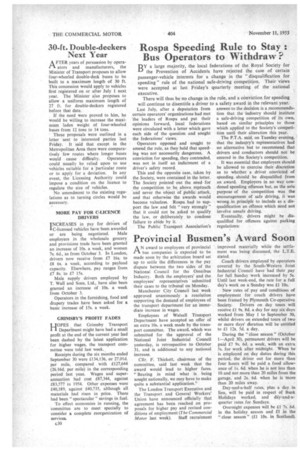30-ft. Double-deckers Next Year
Page 96

If you've noticed an error in this article please click here to report it so we can fix it.
AFTER years of persuasion by operaators and manufacturers, the Minister of Transport proposes to allow four-wheeled double-deck buses to be built to a maximum length of 30 ft. This concession would apply to vehicles first registered on or after July 1 next year. The Minister also proposes to allow a uniform maximum length of 27 ft. for double-deckers registered before that date.
If the need were proved to him, he would be willing to increase the maximum laden weight of four-wheeled buses from 12 tons to 14 tons.
' These proposals were outlined in a letter sent to interested parties last Friday. It said that except in the Metropolitan Area there were comparatively few routes where longer buses would cause difficulty. Operators could usually be relierl upon to use vehicles suitable for a-particular route or to apply for a deviation. In any event, the Licensing Authority could impose a condition on the licence to regulate the size of vehicles.
No amendment to the existing regulations as to turning circles would be necessary.
MORE PAY FOR C-LICENCE DRIVERS I NCREASES in pay for drivers of C-licensed vehicles have been awarded or are being negotiated. Male employees in the wholesale grocery and provisions trade have been granted an increase of 10s. a week, and women 7s. 6d., as from October 3. In London, drivers now receive from £7 16s. to £8 6s. a week, according to payload capacity. Elsewhere, pay ranges from £7 8s. to £7 15s.
Male supply drivers employed by T. Wall and Sons, Ltd., have also been granted an increase of 10s. a week from October 3.
Operators in the furnishing, food and drapery trades have been asked for a basic increase of 15s. a week.
GRIMSBY'S PROFIT FADES
HOPES that Grimsby Transport Department might have had a small profit at the end of the current year had been dashed by the latest application for higher wages, the transport committee were told last week.,
Receipts during the six months ended September 30 were £134,136, or 27.0Id. per mile, compared with £127,644 (26.16d. per mile) in the corresponding period last yeas). Wages and superannuation had cost £87,344, against £83,577 in 1954. Other expenses were £40,189, against £40,735, although all materials had risen in price. There had been " spectacular " savings in fuel.
To effect economies in running, the committee are to meet specially to consider a complete reorganization of services.
c30
































































































































































































































































































